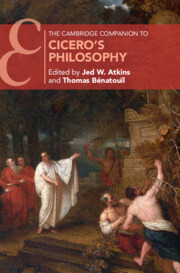Book contents
- The Cambridge Companion to Cicero’s Philosophy
- Series page
- The Cambridge Companion to Cicero’s Philosophy
- Copyright page
- Dedication
- Contents
- Contributors
- Preface
- Cicero’s Philosophical Works
- A Note on Abbreviations
- Introduction
- Chapter 1 Cicero’s Philosophical Writing in Its Intellectual Context
- Chapter 2 The Ciceronian Dialogue
- Chapter 3 Philosophy in Cicero’s Letters
- Chapter 4 Philosophy in Cicero’s Speeches
- Chapter 5 Cicero and the Creation of a Latin Philosophical Vocabulary
- Chapter 6 Cicero and Plato
- Chapter 7 Cicero’s Academic Skepticism
- Chapter 8 Cosmology, Theology, and Religion
- Chapter 9 Determinism, Fate, and Responsibility
- Chapter 10 Cicero on the Emotions and the Soul
- Chapter 11 Ethical Theory and the Good Life
- Chapter 12 Nature and Social Ethics
- Chapter 13 Philosophy, Rhetoric, and Politics
- Chapter 14 Cicero’s Republicanism
- Chapter 15 Empire, Just Wars, and Cosmopolitanism
- Chapter 16 Cicero and Augustine
- Chapter 17 Cicero and Eighteenth-Century Political Thought
- Chapter 18 Cicero and Twenty-First-Century Political Philosophy
- Bibliography
- Index of Cicero’s Texts
- General Index
- Series page
Chapter 11 - Ethical Theory and the Good Life
Published online by Cambridge University Press: 08 December 2021
- The Cambridge Companion to Cicero’s Philosophy
- Series page
- The Cambridge Companion to Cicero’s Philosophy
- Copyright page
- Dedication
- Contents
- Contributors
- Preface
- Cicero’s Philosophical Works
- A Note on Abbreviations
- Introduction
- Chapter 1 Cicero’s Philosophical Writing in Its Intellectual Context
- Chapter 2 The Ciceronian Dialogue
- Chapter 3 Philosophy in Cicero’s Letters
- Chapter 4 Philosophy in Cicero’s Speeches
- Chapter 5 Cicero and the Creation of a Latin Philosophical Vocabulary
- Chapter 6 Cicero and Plato
- Chapter 7 Cicero’s Academic Skepticism
- Chapter 8 Cosmology, Theology, and Religion
- Chapter 9 Determinism, Fate, and Responsibility
- Chapter 10 Cicero on the Emotions and the Soul
- Chapter 11 Ethical Theory and the Good Life
- Chapter 12 Nature and Social Ethics
- Chapter 13 Philosophy, Rhetoric, and Politics
- Chapter 14 Cicero’s Republicanism
- Chapter 15 Empire, Just Wars, and Cosmopolitanism
- Chapter 16 Cicero and Augustine
- Chapter 17 Cicero and Eighteenth-Century Political Thought
- Chapter 18 Cicero and Twenty-First-Century Political Philosophy
- Bibliography
- Index of Cicero’s Texts
- General Index
- Series page
Summary
This chapter discusses Cicero’s views on the relation between ethical theory and the good human life, focusing on his main work on ethical theory, De finibus. Cicero’s critique of Stoic and Epicurean ethics has a common element, all the more striking given the differences between the two doctrines, namely that neither theory is livable with integrity in social contexts. This critique is a reflection both of Cicero’s belief that ethics should engage with lived human experience and of the commitment, in varying degrees, of the Stoics and Epicureans to a conception of the good human life as inherently social. The pluralism of the Old Academy’s ethics discussed in the final part of De finibus escapes this critique but is in danger, through lack of a single supreme value, of failing to offer a basis on which we may structure our lives. Taken as a whole, De finibus can thus be seen to cast a skeptical eye on the viability of ethical theory itself.
- Type
- Chapter
- Information
- The Cambridge Companion to Cicero's Philosophy , pp. 166 - 183Publisher: Cambridge University PressPrint publication year: 2021
Accessibility information
- 2
- Cited by

